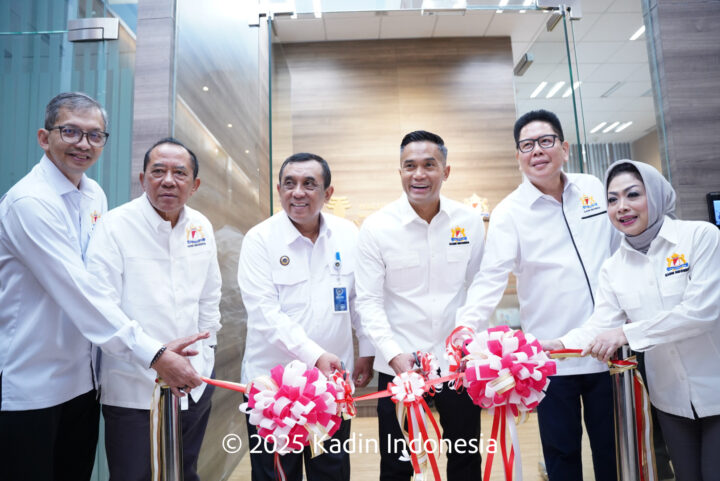
Jakarta - The Indonesian Chamber of Commerce and Industry (Kadin) together with the National Nutrition Agency (BGN) officially inaugurated the Consultation and Assistance Centre of Kadin Indonesia's Gotong Royong Free Meal Task Force (MBG).
The office, located in Tempo Scan Tower Building, South Jakarta, is expected to become a centre for training, certification, and development of the Nutrition Fulfilment Service Unit (SPPG) throughout Indonesia.
The inauguration which took place on Tuesday (13/05/2025) was attended by Kadin Indonesia Chairman Anindya Novyan Bakrie, a number of Kadin Vice Chairmen from various fields, BGN representatives, and Head of Kadin Indonesia's MBG Gotong Royong Task Force, Handojo Selamet Muljadi.
In his remarks, Anindya, who is familiarly called Anin, said that the establishment of this head office was a concrete step to encourage training and assistance for parties who wanted to establish a standardised and certified public kitchen or SPPG.
‘Kadin not only wants to participate, but also wants to run this programme properly and carefully,’ Anin said.
According to Anin, the programme targets to provide nutritious food to around 80 million Indonesian children and supports the government's target of building 30,000 SPPG kitchens across the country.
For the initial stage, Kadin Indonesia together with Tempo Scan and Kadin Institute will run pilot projects in 16 points in various major islands such as Java, Kalimantan, Sulawesi, and Sumatra, with a target completion before 17 August 2025.
‘With this collaboration, we also hope that industrialisation in agriculture can develop and inspire sustainable socio-economic development models,’ he added.
Furthermore, Head of Kadin Indonesia's MBG Gotong Royong Task Force, Handojo Selamet Muljadi, stated that the presence of this headquarters will strengthen the assistance and guidance system.
‘We hope that there will be a guidebook for the establishment of a good and correct SPPG, both in terms of MBG production and business,’ he said.
Meanwhile, National Nutrition Agency Expert, I Dewa Made Agung Kertha Nugraha, also emphasised the importance of an evidence-based approach in programme implementation.
‘With structured and real-needs-based training, we are building a healthy food ecosystem that is not only economically strong, but also socially equitable,’ he said.
In addition, Indonesia Food Security Review representative Glory Harimas Sihombing highlighted the urgency of a scientific approach in supporting the success of food interventions.
‘We believe that food interventions must be underpinned by science and data. Through this training, partners are equipped with not only technical skills, but also an important understanding of nutrition, food security, and its impact on future generations,’ he explained.
Inaugural Training: A Real Step Towards a Golden Indonesia 2045
The day after the inauguration, Wednesday (14/05/2025), Kadin Indonesia Institute together with Indonesia Food Security Review (IFSR) opened the first training for prospective MBG Programme partners.
The training was held at the MBG Task Force Consultation and Assistance Centre Office and attended by 21 participants from various regions, both online and offline for 5 days.
Executive Director of Kadin Indonesia Institute, Mulya Amri, explained that the training aimed to equip participants with an in-depth understanding of nutritious food provision, sustainable food business management, as well as legal aspects and food safety.
‘The goal is to support the national programme to improve the nutritional level of Indonesian children, which is also part of President Prabowo's priorities in realising a Golden Indonesia 2045,’ Mulya said.
According to him, Kadin Indonesia Institute acts as a capacity building institution, especially for businesses and Kadin members who want to actively contribute to the MBG programme.
In the future, similar training will be held massively at the regional level, so that the sustainability of this programme can be maintained and reach more people.
Meanwhile, Chief of Staff of the Office of the Chairman of Kadin Indonesia, Harya Mitra Hidayat or Yuri, said that this training is an important part of Kadin's long-term strategy in supporting the MBG project.
He emphasised that the training is designed to introduce all aspects of the MBG programme to potential partners, from kitchen operations, supply chain, to risk management.
‘The hope is that the participants can truly understand the intricacies of this programme from A to Z, and return to their respective regions as pioneers. They are expected to socialise the benefits of MBG to their communities and build new kitchens in a sustainable manner,’ said Yuri.
According to Yuri, the success of the programme is highly dependent on the dissemination of information and participation from the grassroots.
‘With a full understanding, they can choose their respective roles, both as kitchen managers and food suppliers,’ he said.
Furthermore, Head of Kitchen at Singajaya Jonggol SPPG from BGN, Zanzur Syaputra, highlighted the importance of standardisation and mentoring for optimal implementation of MBG in the field.
‘From our perspective at BGN, the role of training like this is very strategic because it ensures that the kitchens that are set up are actually able to serve nutritious food with appropriate and safe standards. This is not just a kitchen, but a starting point for the future of Indonesian children,’ said Zanzur.
Furthermore, one of the training participants, Adnan Bismari Zaldi, a layer chicken and garment farmer from Klaten, Central Java, admitted that he gained many new insights from the first day of training.
‘There are so many experiences. We made new friends, got new insights about the free nutritious meal programme, and many other things that opened our minds,’ said Adnan.
National Economy
Regional Economy
National Economy
Regional Economy